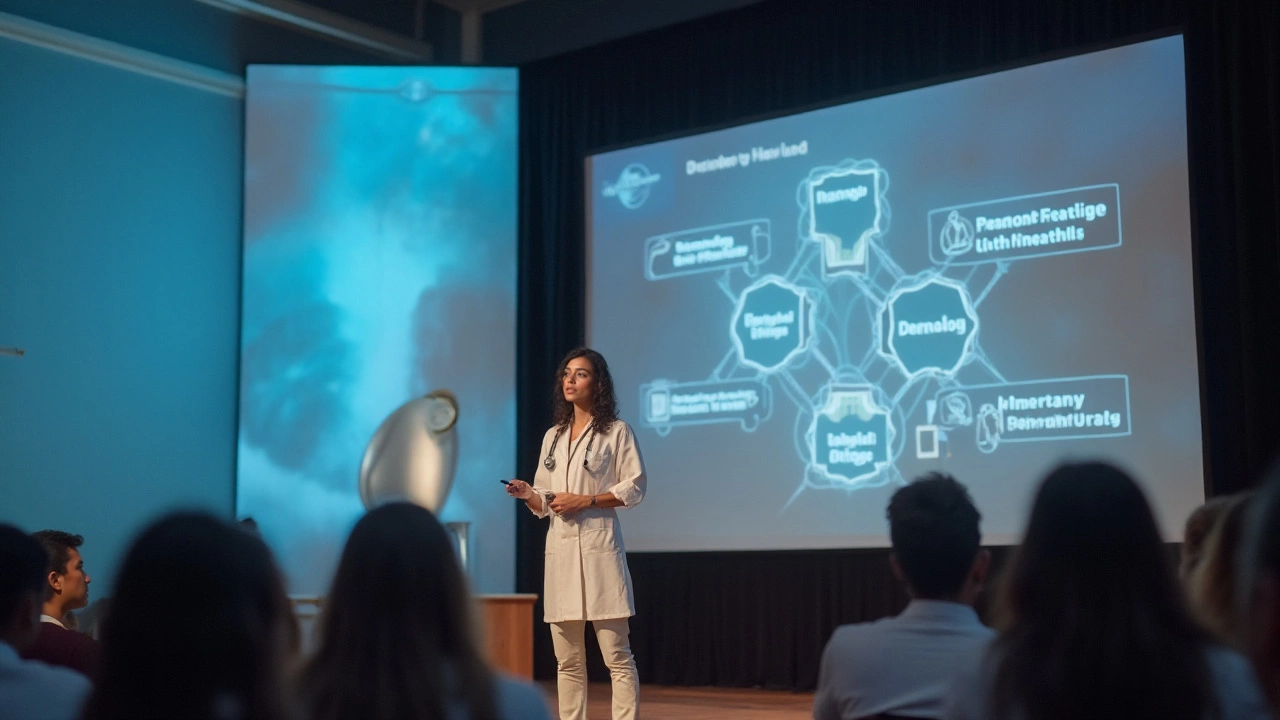Deciding on a medical career is a significant milestone for any young student dreaming of donning the white coat. The world of medicine isn’t just vast; it's a tapestry of varied specialties, and as a girl considering a place in this world, it's essential to find your perfect fit. Each path offers its own unique set of challenges and rewards, so knowing where your passion lies can set the tone for a fulfilling professional journey.
In today's landscape, certain specialties have seen an increased migration of female doctors, driven by a mix of passion, lifestyle preferences, and scope for personal growth. Understanding these specialties can be crucial in making a well-informed choice. There is no 'one-size-fits-all' answer, but by diving into what each specialty entails, we can uncover the odds that weigh in and out for the career you may envision.
From understanding what it means to be a pediatrician, gynecologist, or perhaps a dermatologist, identifying the aspects that align with your values and career aspirations is key. Alongside personal affinities, there's also value in noting the trends and how different specialties are evolving with the changes in healthcare. Ultimately, this decision shapes not only your professional path but often your way of life too.
- Understanding Medical Specialties
- Specialties Popular Among Women
- Factors to Consider for Choosing a Specialty
- Future Trends in Medical Careers
Understanding Medical Specialties
Embarking on a journey to become a doctor is both thrilling and daunting, particularly with the multitude of specialties within the medical field. The realms of medicine are as varied as they are fascinating, offering paths that range from highly practical and hands-on to those requiring acute analytical minds. Choosing a specialty within medicine is akin to selecting a lens through which you wish to view your professional life, with each specialty providing its own unique blend of challenges and rewards.
Medical specialties can essentially be divided into three broad categories: surgical, clinical, and diagnostic. Surgical specialists, like surgeons and anesthesiologists, engage in active intervention, often entering operatory theaters to physically mend patients. Clinical paths, which might include internal medicine or pediatrics, focus on the diagnosis and management of patient health through interactive and continuous patient care. Diagnostic specialties, such as radiology and pathology, involve more investigative work, analyzing data and images to guide treatments indirectly. Female doctors often gravitate toward fields such as obstetrics and gynecology, pediatrics, and dermatology, driven by both personal satisfaction and professional fulfillment. These fields offer a blend of patient interaction, procedural work, and intellectual challenges, making them both rewarding and dynamically engaging.
Understanding these categories is vital as each offers distinct work environments, career paths, and lifestyle implications. A surgeon's life, often demanding long hours in the operating room, differs dramatically from that of a dermatologist, who might have more predictable office hours. As quoted by the American Medical Association, "Your chosen specialty dictates not just your skills but your daily routine, your workplace culture, and often, your community of peers." Hence, introspection about one's personal values and life aspirations is crucial when choosing a specialty, as these choices have lasting impacts on professional and personal landscapes.
It's important to be aware of the evolving trends in the medical field. Data shows a steady increase in female participation in traditionally male-dominated specialties like orthopedics and cardiology. A review of medical trends might even guide young women to explore lesser-chosen paths, backed by growing mentorship and support networks aimed at increasing diversity within the field. Interestingly, a study showed an approximate 25% increase in female applicants in these areas over the last decade, signaling a positive shift in gender dynamics across all medical specialties.

Specialties Popular Among Women
In the dynamic realm of medical careers, some specialties have gained remarkable popularity among women, driven by unique preferences, work-life balance considerations, and personal aspirations. Pediatrics, for instance, continues to draw a substantial number of female doctors due to its inherent appeal of working with children and its generally more structured working hours compared to other specialties. Women often find fulfillment in the distinct blend of compassion and care required in pediatrics, creating a nurturing environment that aligns with a significant number of female professionals.
Another highly sought-after specialty among women is obstetrics and gynecology. This field allows female doctors to play a pivotal role in crucial phases of women's health, from prenatal care to childbirth. Many women choose this path, finding it profoundly meaningful to support fellow women through the life-changing journey of motherhood. In this specialty, doctors can create a supportive patient-doctor relationship grounded in empathy and understanding, which can be tremendously rewarding.
When considering medical specialties, dermatology cannot be overlooked. Its increasing popularity among female aspirants could be attributed to the appeal of blending medical practice with elements of aesthetic treatment, offering versatile career opportunities. Dermatology often presents a manageable work-life balance, making it attractive for women who seek to maintain both a thriving career and fulfilling personal life. A notable statistic shared by the American Academy of Dermatology highlighted the rise in female dermatologists in recent years as a testament to this specialty's attractiveness.
Dr. Mary L. Davenport, a renowned obstetrician, once said, "Medicine is not just about treating illness; it's about understanding the lives and experiences of patients. Women in specialties like obstetrics and gynecology can offer unique insights and empathetic care that make a significant difference in patients' lives."
While the choice of specialty is a personal one, influenced by myriad factors, these fields have undeniably shown a growing trend of female representation. The dynamics and evolving scope of these specialties resonate with many aspiring female doctors, who find these paths not just professionally rewarding but also personally enriching. Encouraging diverse perspectives, these arenas of medicine thrive with increased participation from women, reflecting an industry gradually balancing gender representation.

Factors to Consider for Choosing a Specialty
Selecting a medical specialty is one of the most vital decisions in a doctor's career, carrying significant implications for both personal and professional life. It goes beyond intellectual curiosity and requires introspection and self-evaluation. The first aspect to weigh is personal interest and passion. Often, your enduring love for a particular field like pediatrics or cardiology makes daily challenges feel invigorating rather than burdensome. An anecdote from a seasoned surgeon might remind us that it's the thrill of solving surgical puzzles that kept the flame alive during trying times, underlining how passion is a key motivator.
Equally important is understanding the lifestyle and work-life balance associated with each specialty. Certain fields demand greater time commitments, like surgery, which may swathe your schedule with frequent on-call nights. Conversely, if a stable schedule is a priority, specialties like dermatology or radiology often provide more predictable hours. NEET coaching might encourage discussions around these aspects, helping prospective doctors to visualize their future lives.
Career Longevity and Income
Ahead in your checklist should be considerations of career longevity and financial factors. The lifespan of certain specialties might ebb and flow with advancements in technology and changes in healthcare demands. For instance, telehealth innovations have expanded the scope for family medicine and psychiatry, offering newer platforms to integrate practice with technology. As you navigate this path, it's worth noting that income averages, while a practical consideration, shouldn’t overshadow your true calling. Typically, specialties with lengthier, more intensive training paths often yield higher compensation but come with a significant investment in time and effort.
Competitiveness and Work Environment
Just as crucial is assessing the competitiveness of entering and securing a spot in your desired field. Given that medical seats, especially in popular specialties, are limited, evaluating your academic performance and extracurricular portfolio becomes key. Additionally, observe the social dynamics within each specialty. Specialty fields often differ in their typical work environments—emergency medicine thrives on fast-paced, high-pressure encounters while internal medicine may dwell more on patient relationships and ongoing case management.
"Let your choice of specialty be a reflection of who you are, not just what you can do," suggests Dr. Emily Chang, a respected figure in medical education.
Lastly, exploring future growth prospects in your chosen specialty helps gauge long-term satisfaction and opportunity. Fields like geriatrics are expanding with an aging population, hinting at demand for professionals with niche expertise. As the medical landscape evolves, stay updated with trends through journals and professional networks, embedding flexibility into your career approach. Each of these factors, when considered collectively, guides aspiring female doctors towards a specialty that doesn’t just fit their present self but also their future aspirations.

Future Trends in Medical Careers
As we step deeper into the 21st century, the landscape of medical careers is evolving in ways that are reshaping how medicine interacts with society. With technological advancements accelerating at a rapid pace, doctors now find themselves not just healers, but also at the forefront of cutting-edge research and innovation. One of the significant shifts observed is the integration of artificial intelligence (AI) in diagnostics and treatment planning. For instance, AI's ability to analyze complex datasets can enhance the precision of cancer diagnoses, tailor personalized treatment plans, and even predict outbreaks of infectious diseases before they occur.
Another trend on the rise is the demand for specialists in telemedicine, a field that has seen explosive growth, particularly in the wake of the COVID-19 pandemic. This mode of healthcare delivery breaks geographical barriers, allowing patients from remote areas access to specialists across the globe. As healthcare moves towards a more patient-centric approach, telemedicine is expected to become an integral part of regular medical consultations. According to a study by McKinsey & Company, virtual care engagements increased 38-fold compared to pre-COVID levels, highlighting the transformative impact of telemedicine in current healthcare paradigms.
Moreover, there's a burgeoning focus on preventive medicine aimed at not just treating ailments but preventing them from occurring in the first place. With the advent of wearable technology capable of tracking vital health metrics, doctors are now equipped to monitor patients' health continuously and intervene even before symptoms manifest. This shift towards prevention has opened new specialties and career opportunities for those keen on proactive health management, targeting issues like obesity, diabetes, and cardiovascular diseases.
With globalization, there's also an increasing awareness of the need for cultural competence in medicine. Aspiring medics are encouraged to undertake training that broadens their understanding of diverse cultures, ensuring that healthcare delivery is empathetic and inclusive. This global outlook not only improves patient care but also equips medical professionals to work effectively across different healthcare systems and contexts.
"In the next decade, we'll witness healthcare not just as a service but a technologically enriched ecosystem," predicts Dr. Emily Hurrant, a leading figure in medical informatics. "The nexus of AI, data, and personalized care will redefine the doctor-patient relationship, creating opportunities for new kinds of specialists."
All these changes underscore the importance for future medical practitioners to remain adaptable and continually enhance their skill sets. Those considering a future in medicine should be aware that traditional roles are expanding, creating room for innovative specialties that did not exist a decade ago. Medical education is also evolving, with curriculums now incorporating digital health, bioinformatics, and healthcare technology, preparing the next generation of doctors for challenges that old textbooks never covered. For aspirants, particularly girls looking at NEET coaching and beyond, the field is ripe with opportunities that extend far above and beyond the traditional domains, paving the way for impactful careers in a rapidly developing medical sphere.
